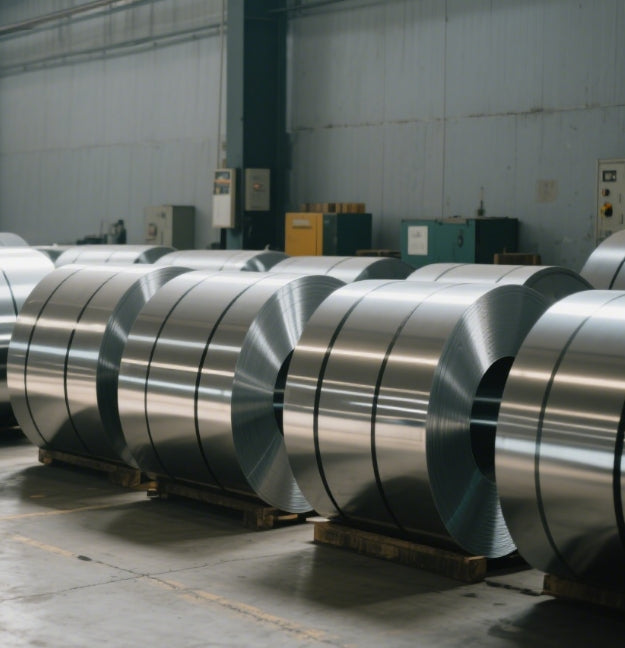StockSteel
Elite Stainless Steel Coil – 316L Mirror Finish
Elite Stainless Steel Coil – 316L Mirror Finish
Couldn't load pickup availability
Elite Stainless Steel Coil – 316L Mirror Finish
Overview
316L Mirror Finish Stainless Steel Coil is an austenitic, low-carbon (≤0.03%) alloy enhanced with molybdenum (2–3%) for superior corrosion resistance in chloride-rich environments. Its mirror finish (≤0.05µm Ra) offers exceptional reflectivity, aesthetic appeal, and reduced friction, making it ideal for architectural facades, medical equipment, and stainless steel coil siding nails. Compliant with ASTM A240, EN 10088-2, and JIS G4303 standards, it delivers unmatched durability and formability.
Technical Specifications
Table 1: Chemical Composition (ASTM A240)
| Element | Content (%) |
|---|---|
| Chromium (Cr) | 16.00–18.00 |
| Nickel (Ni) | 10.00–14.00 |
| Molybdenum (Mo) | 2.00–3.00 |
| Carbon (C) | ≤0.030 |
| Manganese (Mn) | ≤2.00 |
| Silicon (Si) | ≤1.00 |
Table 2: Mechanical Properties
| Property | Value |
|---|---|
| Tensile Strength | ≥485 MPa |
| Yield Strength (0.2% Offset) | ≥170 MPa |
| Elongation (50mm) | ≥40% |
| Hardness (Rockwell B) | ≤95 HRB |
| Modulus of Elasticity | 193 GPa |
Table 3: Physical Properties
| Property | Value |
|---|---|
| Density | 8.0 g/cm³ |
| Thermal Conductivity (100°C) | 16.3 W/m·K |
| Electrical Resistivity | 740 nΩ·m |
| Coefficient of Thermal Expansion | 15.9 µm/m·°C (0–100°C) |
Table 4: Size & Tolerance
| Parameter | Range | Tolerance |
|---|---|---|
| Thickness | 0.3–6.0 mm | ±0.02 mm (Cold Rolled) |
| Width | 650–2000 mm | ±1% |
| Coil Weight | 3.5–20 MT | Customizable |
| Surface Finish | Mirror (No.8), BA, HL | ASTM A480 |
Table 5: Processing Capabilities
| Technique | Tolerance | Standard |
|---|---|---|
| Slitting | ±0.1 mm | ASTM A480 |
| Decoiling | Flatness ≤0.5° | EN 10029 |
| Welding | TIG/MIG compliant | ASME IX |
| Bending | Min. radius: 1.5× thickness | ISO 9013 |
Detailed Properties & Performance
1. Tensile Strength and Bendability
With a minimum tensile strength of 485 MPa, 316L coils withstand extreme pressures in applications like stainless steel coil siding nails and structural components. The alloy’s ultra-low carbon content prevents carbide precipitation during welding, maintaining integrity in welded assemblies. Its elongation (≥40%) allows for tight bending (radius ≤1.5× thickness) without cracking, critical for fabricating complex geometries like heat exchanger housings. Post-bend annealing (850–1050°C) restores corrosion resistance if work hardening occurs.
2. Bending Performance
316L’s austenitic structure provides exceptional ductility, enabling 180° bends without fracture. This is vital for 304 stainless steel coil tubing replacements in corrosive environments, where seamless forming is required for fluid transfer systems. The mirror finish further reduces surface friction during bending, minimizing micro-cracks that compromise corrosion resistance.
3. Identification & Certification
Each coil includes:
- Laser-etched grade markings (e.g., "316L-MF") for traceability.
- Mill Test Certificate (EN 10204 3.1) validating chemical composition, mechanical properties, and compliance with ASTM A240/ASME SB-165.
- Third-party certifications (SGS, TÜV) for nuclear, marine, or pharmaceutical applications.
4. Weight Calculation Formula
Calculate coil weight using:
Weight (kg) = Thickness (mm) × Width (mm) × Length (m) × Density (8.0) ÷ 1000
Example: A 1.2mm × 1219mm × 500m coil weighs ≈5,850 kg (±1% tolerance). Custom widths/lengths are available for bulk orders when you buy stainless steel coil.
5. Corrosion Resistance & Rust Prevention
Molybdenum enhances resistance to pitting/crevice corrosion in chloride-rich settings (e.g., coastal architecture, chemical plants). Rust occurs only under:
- Chloride Exposure: >500 ppm chlorides above 50°C induce stress corrosion cracking.
- Surface Contamination: Iron particles or grease disrupt the passive chromium oxide layer.
- Thermal Damage: Carbide precipitation at 427–857°C reduces intergranular resistance.
Preventive measures include: - Electropolishing: Enhances passive layer uniformity for stainless steel coil siding nails exposed to marine atmospheres.
- Regular Cleaning: Neutral pH solutions remove chlorides without damaging the mirror finish.
Applications
- Architecture: Elevator panels, façade cladding (mirror finish resists fingerprint marks).
- Fasteners: Stainless steel coil siding nails for marine construction (corrosion-resistant ring shanks).
- Fluid Systems: Replacement for 304 stainless steel coil tubing in high-salinity environments.
- Medical: Surgical instrument trays, MRI components (non-magnetic after annealing).
- Heat Exchangers: Condenser coils (superior pitting resistance vs. 304).
Why Choose Our 316L Mirror Finish Coils?
- Zero-Reflection Defects: Mirror finishes achieve ≤0.05µm Ra via triple-stage mechanical polishing, eliminating micro-pits that trap contaminants.
- Global Compliance: Certified to ISO 9001, PED 2014/68/EU, and ASME Sec. VIII for pressure vessels.
- Precision Tolerances: Thickness controlled to ±0.01mm for aerospace and medical tubing.
- End-to-End Customization: Slitting, annealing, and edge-milling tailored to buy stainless steel coil requirements.
- Lifetime Corrosion Warranty: Guaranteed against pitting and crevice corrosion in ISO 9223 Class C2-C4 environments.

